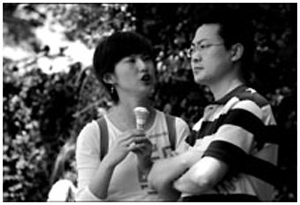In the I-Thou relationship, human beings are aware of each other as having a unity of being. In the I-Thou relationship, human beings do not perceive each other as consisting of specific, isolated qualities, but engage in a dialogue involving each other’s whole being. In the I-It relationship, on the other hand, human beings perceive each other as consisting of specific, isolated qualities, and view themselves as part of a world which consists of things. I-Thou is a relationship of mutuality and reciprocity, while I-It is a relationship of separateness and detachment.
~ Martin Buber, Austrian-born Israeli Jewish philosopher
UPCOMING SEMINAR
The Benefits of Supervision: Evening Seminar with Genjo and Jack
Date TBDJack Blackburn & Genjo Marinello
Jack Blackburn and Genjo Marinello have been providing training and writings about different kinds of professional supervision for many years, both together ands separately. Find out more….
In my writings, I have dealt with many issues that affect bodyworkers, clients, and community. I have dealt with issues that stem directly from clients’ bodies in order to help them grow in conscious awareness. I own here that it would have been impossible for me to write those articles, or even teach the classes that I have taught without the many types of supervision I was receiving at the time.
 Here is some background. Much more is available on my website. When I was told in graduate school that I would be required to receive various types of supervision, I was appalled! Like the letter I quoted above, I had resolved never to go back to corporate America… never to have somebody tell me what to do.
Here is some background. Much more is available on my website. When I was told in graduate school that I would be required to receive various types of supervision, I was appalled! Like the letter I quoted above, I had resolved never to go back to corporate America… never to have somebody tell me what to do.
What I found was completely different. The supervisors I worked with helped me with many of the dilemmas I faced in working with clients, challenged me to design my own goals and achieve them, helped me to start sharing experiences of my inner life for the first time, helped me work through many of my childhood issues, helped me define my practice of body-centered, client-centered spiritual direction and bodywork. In short they helped me to know myself.
Sixteen years later I am still drawing upon those sharings and in one case am still working with the same supervisor. I can unquestionably say that those sessions changed my whole life. I was supported by those individuals in every way possible and to reach further in my life than I ever thought possible.
As a profession, bodyworkers are now facing the prospect of required supervision. Some on the massage board may be concerned that, without adequate oversight, bodyworkers could be susceptible to moving beyond their depth of training and “scope of practice.” Some in the community may advocate that the real reason for supervision is so the supervisor can provide answers in the form of advice and guidance to the practitioner. This corporate view of supervision misses the point that for supervision to work it must appeal to practitioners and empower their growth.
 In my ethics classes (Ethical Dilemmas in Bodywork) I have introduced concepts of peer supervision so that practitioners can create peer groups for discussing their own ethical dilemmas and other professional concerns. The core process of peer supervision is about listening without prejudicial responses, and not about offering advice. Peer supervisors are there for one another, as friends and as colleagues, to offer the support of listening and witnessing.
In my ethics classes (Ethical Dilemmas in Bodywork) I have introduced concepts of peer supervision so that practitioners can create peer groups for discussing their own ethical dilemmas and other professional concerns. The core process of peer supervision is about listening without prejudicial responses, and not about offering advice. Peer supervisors are there for one another, as friends and as colleagues, to offer the support of listening and witnessing.
“Listening into Being,” a phrase borrowed from spiritual direction, means that when we are truly listened to, we are enabled to hear our own inner truth. In my own teaching of supervision I lead groups and individuals through a process of silent listening, which means to listen to another without responding with affirmation or repudiation. This is a basic starting point for learning true supervision.
Even something as simple as asking a question can be a form of giving advice or offering approval or disapproval. So it is an important first step to practice silent listening. Silent listening allows supervisor trainees to hear the chatter of their own minds… called “metathought”. Until we practice silence, we stay unaware of how much we are listening to ourselves rather than others. It can take a long time of practicing silent listening until we become comfortable with the silence of no-thought, one of the signs of presence.
As a profession we bodyworkers can provide that kind of support for one another. Our work is probably the most intimate of all forms of caregiving. As we accompany clients over the years we are witnessing for their changed relationships with their bodies. We are addressing the instrument of their livingness, the body, in a caring and affirmative manner. If we journey with them long enough we may witness their transition towards less physical and more spiritual existence. As we change, our bodies change, our work changes, it is very helpful to have our friends and colleagues witnessing for us. As we recognize those changes within ourselves, we start to recognize that our supervisory relationship is one of the deepest relationships we will ever have.

Jack Blackburn’s Focus Group 2010
~Jack Blackburn © 2010



 Real supervision is a fine art that requires deep listening, into the presence. This form of listening is quite rare and must be carefully cultivated. Listening to another with full attention requires that we drop beneath our own thoughts and judgments. You can test this out be observing your own mind as you are listening to a friend, a client or a colleague. You will find your mind anticipating, projecting, making up stories, distracting, and looking for solutions. We rarely admit to ourselves or to others that this is happening. If you observe the body language of persons who are having a conversation, you can notice the revealing choreography that accompanies the conversation; eyes out-of-focus, attention to cell phone or wrist watch, body turned away, foot tapping, yawning, and watching other persons or activities. All of these internal and external dynamics seem to happen whenever we listen. But there is another way.
Real supervision is a fine art that requires deep listening, into the presence. This form of listening is quite rare and must be carefully cultivated. Listening to another with full attention requires that we drop beneath our own thoughts and judgments. You can test this out be observing your own mind as you are listening to a friend, a client or a colleague. You will find your mind anticipating, projecting, making up stories, distracting, and looking for solutions. We rarely admit to ourselves or to others that this is happening. If you observe the body language of persons who are having a conversation, you can notice the revealing choreography that accompanies the conversation; eyes out-of-focus, attention to cell phone or wrist watch, body turned away, foot tapping, yawning, and watching other persons or activities. All of these internal and external dynamics seem to happen whenever we listen. But there is another way.

 Most bodyworkers are self employed and independent of corporate structures. Most are self directed and responsible mainly to themselves. How can we look at supervision as a benefit for self-employed practitioners and their clients? We must start from a different premise; practitioners are accountable to themselves and their clients.
Most bodyworkers are self employed and independent of corporate structures. Most are self directed and responsible mainly to themselves. How can we look at supervision as a benefit for self-employed practitioners and their clients? We must start from a different premise; practitioners are accountable to themselves and their clients.




